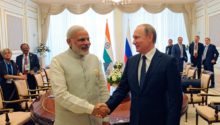contributors
Andrei Volodin

Independent analyst and researcher
all articles


The June summit of the Shanghai Cooperation Organization in Tashkent was marked by an important event: India and Pakistan signed a memorandum signaling their commitment to ratify all current SCO treaties, an act that opens their path to full membership in the organization. This pivotal decision to expand the Shanghai Cooperation Organization by adding two major South Asian countries was adopted in 2015 at the SCO summit in Ufa, and the next required step was taken in the capital of Uzbekistan…


The international conference «The Great Infrastructure of Eurasia: New Industrialization and Geopolitics of Peace» (Le Grandi Infrastrutture Euro-Asiatiche: Nuova Industrializzazione e Geopolitica Della Pace) took place in Rome on November 27-28, 2014. It leaves the impression that Europe has begun to mull its future relationship with Russia. Pepe Escobar, a well-known international relations analyst, has said that Russia is wired for «playing the long game with the West» with tangible results to appear on «the grand chessboard» after some time. That is something to agree with. At that there is something more important in question than just a game to play or, perhaps, this is a game with a win-win outcome…


According to the supposition put forward by Jacques Sapir, a well-known French economist, in the autumn of 2012 the Russian government came to conclusion that Europe exported to Russia slow economic growth and the threat of stagnation. He believes that it pushed Moscow to adopt a more balanced policy towards the West and the East… President Putin has just wound up his visit to India that the Indian media called «productive»… India unambiguously reiterated its negative attitude towards the anti-Russian sanctions. It’s an important contribution into creating a better economic climate. It’s only natural for New Delhi to adopt this approach as India itself has often fallen prey to Washington’s whims… Observers pointed out the fact that the Republic of Crimea had its representatives among the members of Russian delegation. Indian business circles are interested in establishing cooperation with the region…


On May 26, 2014 Narendra Modi was sworn as the 16th Prime Minister of India – «the largest democracy of the world». .. The new India’s strategy to large extent depends on the personality of Narendra Modi, who is known for his backbone and clear vision of India’s role as an independent actor in international politics. The focus on national interests has become tangible in the contemporary foreign policy based on the India First principle… It’s not easy to implement the policy of «India’s interests go first» in the contemporary world. But the very existence of the state-civilization presupposes independent foreign policy. That’s why the triangle Delhi-Beijing-Washington is to be a balanced relationship.


Russian President V.Putin plans to visit Islamabad in the not too distant future. The talks promise a rich agenda which includes the inking of 12 agreements on the bilateral cooperation between Russia and Pakistan in a variety of spheres… The time has come when Russia simply has to mirror the US activity in South Asia. The steps to be taken are to up the level of relations with India to the Soviet-era mark and, at the same time, to fully reconnect with Pakistan. Both Delhi and Islamabad would likely favor Moscow's parallel return…


The 24th Asia-Pacific Economic Cooperation (APEC) annual summit is to take place on September 2-8 in Vladivostok. Today APEC is the largest economic forum for 21 Asia-Pacific nations accounting for 57% of world GNP and 48% of world trade. As is known India has requested membership in the organization. Russia strongly supports the urge of the «world’s largest Democracy» to accede. Moscow rightly believes that adding the dynamic economy of the Elephant to the Dragon (China), an active APEC participant, will open new opportunities for all those who have joined the forum…


The second phase of Arab political revolutions is inevitable; this time the Persian Gulf “oil monarchies” will be the targets. The process could be slowed down but it cannot be prevented. The involvement of some Persian Gulf states leaders into the Syrian conflict just speeds up the denouement – the “regime change” in the Gulf countries, dismantling other state structures in the “Greater Middle East” drawn on US maps and (political) fading away of a number of leaders (Western clients ) that are in power now…


Which Indian political institution is finally responsible for foreign policy? Isn’t there some “non-constitutional center of power” hidden from public view in the bowels of “the world’s largest democracy” that has been gradually but irreversibly revising the foreign policy strategy of the “Nehru course”? Naturally it is being done under the guise of “updating” or “making it more relevant to the realities of the XXI century”…


A new Indian President will be elected on July 19. It used to be an important but a rather ritual occasion due to the fact the presidential functions were rather “ceremonial”. Now the situation has dramatically changed to influence the country’s life to great extent…


Beijing seems to be confident that because of its involvement in military activities in Afghanistan, the weakening of U.S. position in Pakistan has become a hardly noticeable but irreversible trend. Probably the new ‘equation’ of geopolitical power in Central Asia will make China emerge as a dominant “actor” in the area… China actively participates in the modernization of transport infrastructure in Pakistan. In fact, the implementation of projects is aimed at achieving a two-in-one objective: to ensure safe transportation of energy along the Persian Gulf – South China Sea route and to limit the U.S. influence in some area of the Middle East, South and Central Asia that are ‘sensitive’ spots for China…



